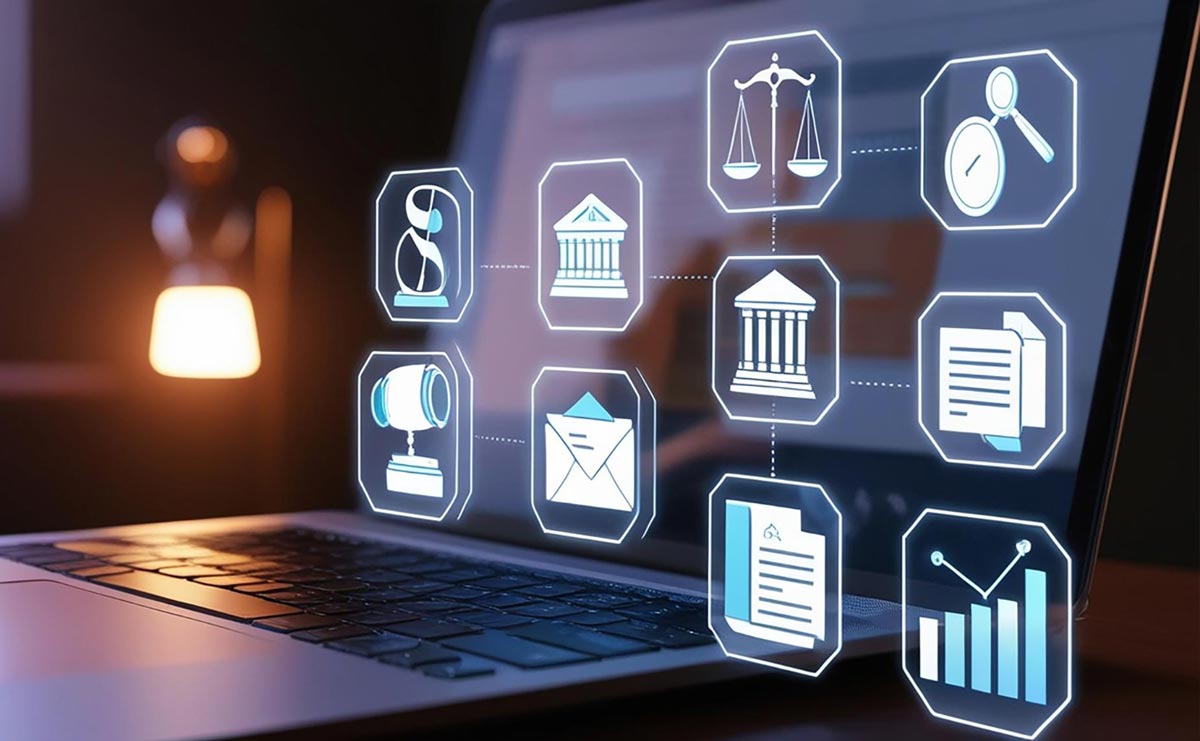Contents
Streamline Your Legal Practice with Calendaring and Scheduling Software
In today’s fast-paced legal world, staying on top of appointments, deadlines, and schedules is essential for running an efficient practice and keeping clients happy. Missing a deadline or accidentally double-booking can lead to missed opportunities, unhappy clients, or even malpractice claims. That is where calendaring and scheduling software comes in. These tools are designed to simplify your workflow, ease administrative tasks, and help you stay compliant with important deadlines. With legal scheduling software, attorneys can focus on their cases instead of spending hours coordinating calendars. In this article, we will dive into why this software is a must-have for law firms, what features you should look for, and how the right solution can make a real difference in your practice.
Why Calendaring and Scheduling Software Is Essential for Law Firms
Calendaring software for law firms simplifies the process of managing complex litigation schedules across multiple attorneys. For law firms looking to stay competitive and organized, adopting robust calendaring software is no longer optional—it is essential. Legal scheduling software simplifies complex scheduling tasks, such as coordinating depositions across multiple time zones. Here are the reasons why calendaring and scheduling software is necessary for running law firms:
Mitigating the Risk of Missed Deadlines
Legal professionals must adhere to strict deadlines for court filings, client meetings, and compliance requirements. Missing these deadlines can have severe consequences, including case dismissals or client dissatisfaction. Calendaring software minimizes the risk of errors by automating reminders for critical dates and syncing these deadlines with your case management system. Legal scheduling software also allows clients to book consultations online, improving accessibility and efficiency.
Boosting Productivity
Efficient scheduling tools save countless hours by automating repetitive tasks like sending appointment reminders, updating case files with new deadlines, or rescheduling conflicts. This allows attorneys and staff to focus on substantive legal work rather than administrative overhead. The flexibility of scheduling software for lawyers makes it possible to manage calendars from any device, ensuring constant accessibility. Law firm calendaring software not only helps track deadlines but also integrates with billing systems for accurate time management.
Improving Client Communication
Scheduling software often integrates with client-facing tools, such as online booking portals, making it easier for clients to schedule consultations. Automated notifications ensure clients are reminded of their appointments, reducing no-shows and managing client expectations by providing clear communication about upcoming appointments.

Reduced Scheduling Conflicts
Automated scheduling prevents double bookings and reduces human error. Real-time updates ensure everyone can access the latest information, minimizing conflicts and missed appointments. Streamlined appointment scheduling for lawyers helps ensure that valuable time is allocated to high-priority tasks.
Streamlined Communication
Many scheduling tools integrate with email, messaging apps, and other communication platforms, enabling seamless updates and notifications about upcoming events or changes.
24/7 Accessibility
Cloud-based scheduling software allows users to access their calendars from anywhere. This flexibility primarily benefits remote teams or professionals working across different time zones.
Automated Reminders and Notifications
Automated reminders reduce no-shows and late arrivals. Notifications can also inform team members about last-minute changes, ensuring everyone stays on the same page. Calendaring software for law firms can send automated notifications to both attorneys and clients, keeping everyone informed.
Integration with Other Tools
Many calendaring solutions integrate CRM systems, task management tools, and email platforms, creating a unified workflow. This integration reduces data entry duplication and ensures consistency across platforms. The integration of law firm calendaring software with client relationship management tools can enhance overall efficiency in legal practice.
Data-Driven Insights
Advanced scheduling tools provide analytics on meeting durations, cancellations, and attendance. This data helps organizations identify inefficiencies and improve scheduling practices.
Enhanced Team Collaboration
Shared calendars allow team members to view each other’s availability, making scheduling meetings and collaborating easier. Automated appointment scheduling for lawyers allows seamless coordination across multiple team members’ calendars.
Cost Savings
Calendaring software can save businesses significant costs in the long run by reducing administrative overhead and increasing operational efficiency.
Customization and Scalability
Many tools offer customizable features to meet specific industry needs, making them ideal for both small teams and larger organizations with complex scheduling demands.
Eco-Friendly Approach
Digital scheduling reduces the need for paper planners, printed agendas, and physical mail reminders, aligning with sustainable business practices.
By implementing robust calendaring and scheduling software, businesses can enhance efficiency, improve client relationships, and foster a more organized work environment.
Key Features to Look for in Legal Calendaring and Scheduling Software
1. Deadline Calculation and Management
Look for software that calculates deadlines based on court rules and procedural requirements. Many platforms integrate with rule-based calendaring systems, which can automatically adjust deadlines based on jurisdictional requirements.
2. Integration with Case Management Systems
The software should integrate seamlessly with your case management system, ensuring that appointments, deadlines, and case data are synchronized across platforms.
3. Customizable Reminders
Customizable reminders for lawyers, staff, and clients ensure everyone stays informed about upcoming tasks and events. Options for email, SMS, or app notifications enhance accessibility.
4. Online Client Booking
A client-facing booking portal allows clients to schedule appointments based on their availability. This not only saves administrative time but also enhances client convenience.
5. Mobile Access
With busy schedules and frequent court appearances, attorneys need the flexibility of mobile access to their calendars. Look for software with robust mobile apps or browser-based interfaces for on-the-go updates, providing a sense of control and adaptability.
6. Conflict Checking
Calendaring software for law firms offers features like conflict checks, helping attorneys avoid overlapping commitments. This feature provides a sense of security and organization, enhancing the overall efficiency of the legal practice.
How to Implement Scheduling Software in Your Law Firm
Many firms have improved their efficiency by implementing scheduling software for lawyers that integrates with case management systems.
- Assess Your Needs
Evaluate your firm’s specific scheduling and calendaring challenges. Are you struggling with missed deadlines, client no-shows, or inefficiencies in team collaboration? Identifying pain points will guide your software selection.
- Research and Choose a Solution
Compare software options for legal professionals. Popular choices include RunSensible, MyCase, and Clio. Look for features that align with your firm’s needs, such as court rules integration or client booking portals.
- Train Your Team
Ensure everyone at your firm understands how to use the software. Comprehensive training minimizes resistance to change and maximizes the tool’s effectiveness.
- Integrate with Existing Tools
Ensure the software integrates with your existing systems, such as email clients, case management tools, and accounting software. Scheduling software for lawyers can track billable hours linked to appointments, making invoicing more accurate and transparent.
- Monitor and Adjust
Once implemented, monitor the software’s performance. Gather feedback from your team and clients to make necessary adjustments and optimize usage.
Legal Calendaring for Personal Injury Attorneys
Legal calendaring for personal injury attorneys comes with unique challenges that demand precision and adaptability. From managing varied statutes of limitations across jurisdictions to handling a high volume of cases, attorneys must meticulously track multiple deadlines to avoid costly errors. The unpredictability of court schedule changes, contingent case milestones (e.g., medical treatment timelines or settlement negotiations), and coordination with multiple parties like medical providers and insurance adjusters further complicate the process. These dynamics require robust systems to ensure no critical deadlines or appointments are missed. Calendaring software for law firms helps keep track of statute of limitations dates, reducing the risk of costly oversights.
To address these challenges, attorneys should utilize specialized calendaring tools integrated with case management software to automate deadline calculations, provide real-time updates, and sync with court calendars. Implementing a centralized, color-coded system and delegating calendar oversight to a dedicated staff member can enhance organization and reduce errors. Regular cross-checks, firm-wide protocols for updates, and flexibility for contingencies, such as delays in medical evaluations or settlement talks, are essential for managing shifting timelines. By adopting these strategies and leveraging technology, personal injury attorneys can efficiently handle their caseloads, reduce risks, and focus on achieving better client outcomes. In fact, with calendaring software for law firms, attorneys can coordinate schedules across teams and avoid conflicting appointments. For solo practitioners, attorney scheduling software is an essential tool for balancing client appointments with case preparation.
The Future of Legal Scheduling: AI and Predictive Tools
Artificial Intelligence (AI) and predictive tools are revolutionizing legal scheduling by enhancing law firms’ efficiency, accuracy, and adaptability. These technologies streamline various aspects of legal practice, including meeting coordination, court date management, and resource allocation.
AI-Powered Scheduling Tools
Modern AI-driven scheduling applications analyze calendars, case priorities, and deadlines to suggest optimal meeting times and court dates. For instance, Microsoft’s “Places” platform utilizes AI to optimize hybrid work schedules, helping legal professionals effectively coordinate in-office and remote work.
Predictive Analytics in Legal Practice
Predictive analytics tools assess historical data to forecast case timelines and outcomes, aiding resource planning and deadline management. These tools enable law firms to anticipate potential delays and allocate resources efficiently, improving overall case management.
Automated Meeting Coordination
AI assistants can automate the scheduling of meetings and court appearances by considering participants’ availability and preferences. This automation reduces administrative burdens and minimizes scheduling conflicts, allowing legal professionals to focus on substantive legal work.
Integration with Legal Management Systems
AI scheduling tools often integrate seamlessly with legal management software, providing a unified platform for case management, document handling, and scheduling. This integration ensures that all aspects of a case are coordinated efficiently, reducing the risk of missed deadlines or overlapping commitments.
Enhanced Client Communication
AI tools can also facilitate client interactions by automatically scheduling consultations and updates, ensuring timely communication, and improving client satisfaction. By managing routine scheduling tasks, AI allows legal professionals to dedicate more time to client engagement and case strategy.
In essence, integrating AI and predictive tools into legal scheduling practices offers significant benefits, including improved efficiency, reduced administrative workload, and enhanced client service. As these technologies evolve, they are poised to become indispensable components of modern legal operations.
Enhance Your Law Firm Scheduling with RunSensible
Tailored for law firms, RunSensible offers customizable appointment scheduling options, automated reminders, and easy integration with the firm’s existing case management tools. It provides a comprehensive solution that reduces no-shows and enhances the client experience.
RunSensible further allows law firms to create personalized booking links for specific attorneys or legal services, enabling clients to schedule consultations based on their needs. Its robust scheduling features include setting buffer times between appointments, limiting booking windows, and automatically adjusting availability based on team members’ calendars. The system integrates seamlessly with existing CRM and billing systems, ensuring that every scheduled consultation is efficiently recorded and synced with client profiles for easy follow-up. With a cloud-based calendaring system, the team can access their schedules from anywhere, ensuring flexibility and efficiency.
In addition, RunSensible supports multi-staff scheduling, allowing teams to coordinate meetings or consultations that require multiple attorneys or departments. The platform’s automated reminders and confirmations are fully customizable, helping law firms maintain clear and professional communication with clients. By streamlining the scheduling process and reducing the administrative burden, RunSensible cuts down on no-shows and improves operational efficiency, leaving law firms more time to focus on casework and client engagement.
Final Thoughts
In the competitive and fast-paced legal industry, efficiency is not just an advantage—it is a necessity. An effective calendaring system is crucial for legal professionals juggling multiple cases and tight deadlines. Implementing robust calendaring and scheduling software is a game changer for law firms, helping mitigate risks, enhance productivity, and improve client satisfaction. From automating reminders to integrating seamlessly with existing tools, the right solution can simplify operations and free up valuable time for attorneys and staff to focus on what truly matters: delivering exceptional legal services.
With the added potential of AI and predictive tools, the future of legal scheduling is brighter than ever, offering even greater precision, adaptability, and client-centered service. Tools like RunSensible exemplify how tailored solutions can transform scheduling into a strategic asset, ensuring law firms stay organized, compliant, and client-focused.
For law firms aiming to thrive in today’s demanding environment, investing in advanced calendaring and scheduling software is not just a smart choice—it is an essential step toward long-term success. Many firms use tools specifically designed for appointment scheduling for lawyers to streamline their daily operations.
FAQs
What is legal calendaring and scheduling software?
Legal calendaring and scheduling software is a tool designed to help law firms and attorneys manage appointments, deadlines, court dates, and other critical tasks efficiently while ensuring compliance with legal timelines and regulations. With features like conflict checking and automated reminders, attorney scheduling software helps lawyers avoid scheduling conflicts and missed deadlines.
Can I sync the software with my existing calendars (Google, Outlook, etc.)?
Most legal scheduling software like RunSensible supports synchronization with popular calendar platforms, ensuring seamless management across devices.
Is RunSensible software suitable for solo practitioners as well as large firms?
Yes, legal calendaring and scheduling software is scalable and can be tailored to meet the needs of solo attorneys, small practices, and large law firms.
Can RunSensible help with billing by tracking time spent on appointments?
Yes, RunSensible assists with billing by tracking time spent on appointments. Its time-tracking feature allows you to log time entries from various activities, including calendar events, tasks, communication logs, notes, and documents. This comprehensive tracking ensures that all billable hours are accurately recorded, facilitating precise billing and invoicing.
Disclaimer: The content provided on this blog is for informational purposes only and does not constitute legal, financial, or professional advice.







